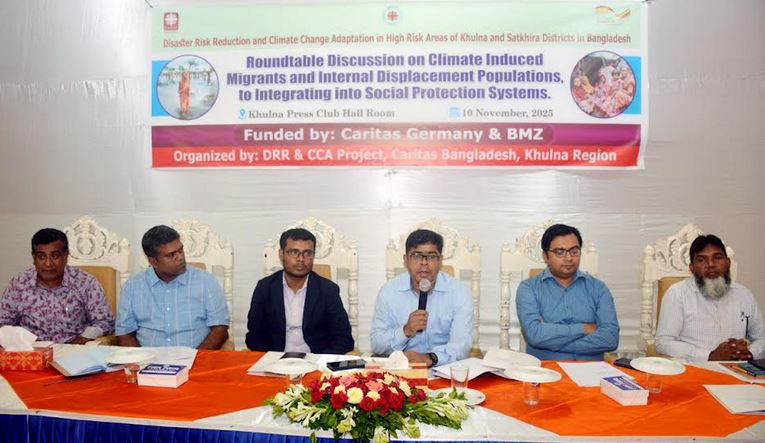News Flash

KHULNA, Nov 10, 2025 (BSS) - Experts at a roundtable discussion on
Monday emphasized the urgent need to formally include climate-induced
displaced populations of Bangladesh's southwest coastal region under the
national social protection framework.
The roundtable titled "Integrating Climate-Induced Migrants and Internally
Displaced Populations into the Social Protection System" was held at the
Khulna Press Club auditorium, organised by Caritas Khulna Region.
The event brought together policymakers, academics, government officials,
development organisations, and representatives from climate-vulnerable
migrant communities of Khulna City Corporation's Wards 09, 21, 22, and 31.
The main objective of the discussion was to bridge the policy-practice gap
between disaster management strategies and the ground realities faced by
displaced urban communities.
The session began with an introductory speech by Dr. Sumon Kumar Malakar,
programme officer of Caritas Khulna Region, who outlined the purpose of the
roundtable discussion.
In his welcome remarks, Mr. Albino Nath, regional director of Caritas Khulna
Region, reiterated the organisation's strong commitment to Disaster Risk
Reduction (DRR) and Climate Change Adaptation (CCA) initiatives in the
country's disaster-prone southwest.
He stressed the importance of adopting an integrated approach that combines
DRR, CCA, and Social Protection (SP) to ensure resilience and that no one is
left behind.
The coastal districts of Khulna and Satkhira continue to face recurring
disasters such as cyclones, floods, and salinity intrusion.
These hazards force thousands of people to migrate to urban slums, where they
often face new socio-economic challenges and remain excluded from traditional
social protection programmes due to lack of proper documentation and insecure
housing.
Speaking as the chief guest Md. Feroz Shah, acting divisional commissioner of
Khulna, stated, "Internal displacement due to climate change is now a visible
reality. Integrating these communities into the national social protection
system is a pressing need of the time. Through coordinated efforts between
government and non-government actors, we can establish an inclusive and
sustainable social protection mechanism."
He further noted that the evidence and recommendations generated by field-
based organisations like Caritas could play a vital role in informing future
policy directions.
Addressing as the special guest, Sharif Asif Rahman, chief executive officer
and secretary of Khulna City Corporation (KCC), remarked, "The city
corporation deeply acknowledges the plight of climate-induced migrants. We
are working to integrate these vulnerable populations into our urban
development, health, and social welfare planning. Strengthening partnerships
with organisations like Caritas will help accelerate inclusive urban
resilience initiatives."
Dr. Mohammad Ismail Hossain, assistant professor at the Institute of Disaster
Management of Khulna University of Engineering and Technology (KUET), who
shared critical findings on the impact of climate change across three coastal
upazilas, presented the keynote paper.
During the open discussion, participants highlighted that existing social
protection systems are largely designed for permanently settled populations
and fail to address the specific vulnerabilities of mobile or displaced
groups.
They called for innovative, shock-responsive delivery mechanisms and stronger
policy alignment to support these vulnerable populations.